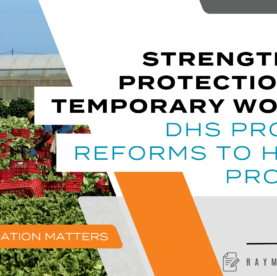UPenn Study Finds that GOP Plan to Cut Immigration Will Lower America’s GDP
A new study from the University of Pennsylvania’s Wharton School shows that the Republican plan to cut immigration in half will reduce the U.S. per capita gross domestic product by .7 percent over the next ten years, and by 2 percent by 2040.
The study is a direct response to the RAISE Act, introduced by Arkansas senator Tom Cotton and Georgia senator David Perdue and endorsed by President Trump, which calls for halving total legal immigration and putting an emphasis on high-skilled workers (for further information on this bill, please see our previous coverage here). The president and other Republicans believe that this will create job opportunities for American citizens and help build the overall economy.
However, the Wharton study comes to the opposite conclusion. Kimberly Burham, economist and managing director of the Penn Wharton Budget Model, states that “in the long run, if you reduce the level of immigration in combination with increasing the proportion of immigrants that are highly skilled, GDP is still going to drop.”
As reported in this study and NBC News, there are multiple reasons why immigration helps grow the American economy. First of all, as Burham notes, “It’s a combination of more people buying and increasing size of the market. . . . It’s also a matter of more people creating a larger pool of savings and investments that can create economic growth in the long run.” Thus, in the alternative, a shrinking population reduces the overall economy. As Mark Zandi, chief Moody’s economist, put it, “more immigrants are going to be buying more.”
Second of all, as large numbers of baby boomers retire and create huge vacancies in employment, immigrants fill those vacancies. As further noted by NBC News, the crackdown on immigration that is already underway is affecting the ability of many employers to find qualified candidates – in other words, supply is not meeting demand.
Finally, immigration of low-skilled labor actually works to keep consumer costs down, which benefits lower income Americans and allows for greater spending. While it is true that competition in the workplace can lower wages in certain employment areas, Georgetown University Professor Harry Holzer notes, as reported by NBC, that immigrant labor reduces both costs of both goods and services and increases tax revenue, which can be spent in a wide variety of needed areas.
As universities, businesses, and politicians continue to weigh in on various immigration plans moving through Congress, the NMM Immigration Blog will continue to provide updates and analysis on the latest developments.
If you have questions regarding immigration, please contact me at wcmenard@nmmlaw.com.




